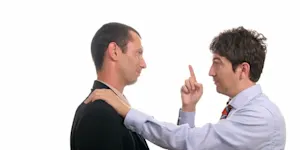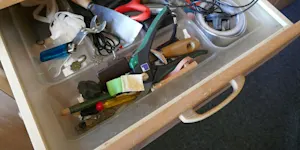What Makes This Word Tick
"Discombobulated" is one of those deliciously quirky words that paints a picture of someone feeling bewildered or out of sorts. It's an amusing way to describe the sense of being confused or disoriented. The word has a playful quality, almost as if it's teasing the very state of confusion it defines.
If Discombobulated Were a Person…
Imagine Discombobulated as an absent-minded professor type, constantly misplacing their glasses while they're perched on their head. This character might be a little frazzled but endearing, always juggling too many things at once and never quite finding their footing.
How This Word Has Changed Over Time
"Discombobulated" is a relatively recent addition to the English lexicon, gaining popularity in the 19th century. It started as something of a humorous or nonsensical invention, yet it's stuck around, perhaps because it so delightfully captures the sensation of being mentally scattered.
Old Sayings and Proverbs That Use Discombobulated
While traditional proverbs don't include "discombobulated," its spirit can be found in phrases like "all over the place" or "at sixes and sevens." These expressions convey a similar sense of confusion or disarray.
Surprising Facts About Discombobulated
Though it sounds wildly inventive, "discombobulated" was born out of a playful trend in the 1800s to create fanciful words from Latin roots or mimicking Latin sounds. It's part of a family of similarly whimsical terms like "confusticated" or "discomfuddled."
Out and About With This Word
You might hear "discombobulated" in everyday conversations when someone is having a particularly off day. It’s often used humorously to describe the state of being late, losing keys, or mixing up appointments.
Pop Culture Moments Where Discombobulated Was Used
The word "discombobulated" pops up in films and TV shows to comedic effect, emphasizing moments of chaos. It’s the perfect descriptor for characters who find themselves in slapstick predicaments.
The Word in Literature
Authors love using "discombobulated" to inject a bit of humor in otherwise serious narratives or to vividly describe a character’s mental chaos. It can often be found in comedic novels or whimsical stories where a touch of confusion adds flavor to the plot.
Moments in History with Discombobulated
While "discombobulated" may not headline major historical events, it could aptly describe the feeling in many chaotic historical moments—such as the stock market crash of 1929, when people were collectively bewildered by the sudden economic turmoil.
This Word Around the World
There are various cultural equivalents and translations for "discombobulated," each reflecting the universal human experience of confusion. In French, one might feel "dérouté," or in Spanish, "desconcertado," both capturing a similar disorientation.
Where Does It Come From?
"Discombobulated" is likely derived from the Latin prefix "dis-" meaning "apart" or "away," combined with a playful concoction mirroring words like "combobulated," which doesn't actually exist in English but adds to its humorous aura.
How People Misuse This Word
Sometimes people use "discombobulated" to describe physical disorder or chaos, while it more precisely refers to mental confusion or bewilderment. It’s subtle, but significant!
Words It’s Often Confused With
Disconcerted: Often interchanged, but "disconcerted" usually implies slightly less severe confusion.
Disoriented: More about losing direction in a physical space, though it can overlap with mental disarray.
Flustered: Shares the theme of confusion but often involves stress or anxiety.
Additional Synonyms and Antonyms
For synonyms, think along the lines of "confounded," "bewildered," or "mystified." On the flip side, antonyms like "composed," "collected," and "clear-headed" depict the serenity discombobulation disrupts.
Want to Try It Out in a Sentence?
"After the unexpected detour and traffic delay, Martha arrived at her meeting completely discombobulated, with her notes in disarray and her coffee cup inexplicably empty."
















